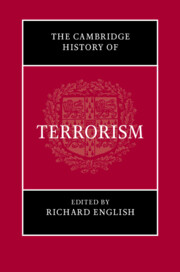Book contents
- The Cambridge History of Terrorism
- The Cambridge History of Terrorism
- Copyright page
- Contents
- Figures
- Tables
- Acknowledgements
- Contributors
- Part I Introduction
- Part II Frameworks and Definitions
- 2 History and the Definition of Terrorism
- 3 Terrorism, History and Periodisation
- 4 Terrorism, History and Regionalisation
- 5 A Processual Approach to Political Violence
- 6 Terrorism, History and Neighbouring Disciplines in the Academy
- Part III Historical Case Studies in Terrorism
- Part IV Thematic Essays
- Part V Conclusion
- Index
- References
2 - History and the Definition of Terrorism
from Part II - Frameworks and Definitions
Published online by Cambridge University Press: 07 May 2021
- The Cambridge History of Terrorism
- The Cambridge History of Terrorism
- Copyright page
- Contents
- Figures
- Tables
- Acknowledgements
- Contributors
- Part I Introduction
- Part II Frameworks and Definitions
- 2 History and the Definition of Terrorism
- 3 Terrorism, History and Periodisation
- 4 Terrorism, History and Regionalisation
- 5 A Processual Approach to Political Violence
- 6 Terrorism, History and Neighbouring Disciplines in the Academy
- Part III Historical Case Studies in Terrorism
- Part IV Thematic Essays
- Part V Conclusion
- Index
- References
Summary
It is now a cliché to observe that, despite innumerable efforts to define terrorism, scholars are no nearer to arriving at a consensus. One approach has been to assemble the multitude of definitions produced by academics, commentators, governments and international organisations, in an attempt to identify common ground. There is much to admire in this ethos of catholicity – though the final product can feel more like a catalogue of component parts than a cohesive and workable definition. How, then, should historians approach the debate over how to define terrorism? To explore this question, this chapter begins by reflecting on the ‘genealogical turn’ in historical method – a development closely associated with the ‘Cambridge school’ of intellectual history. It will then attempt to construct a genealogy for ‘terrorism’, as reflected in existing historical narratives of this subject. And finally, it will consider what key themes emerge from such a genealogical examination.
- Type
- Chapter
- Information
- The Cambridge History of Terrorism , pp. 31 - 57Publisher: Cambridge University PressPrint publication year: 2021
References
Further Reading
- 1
- Cited by



